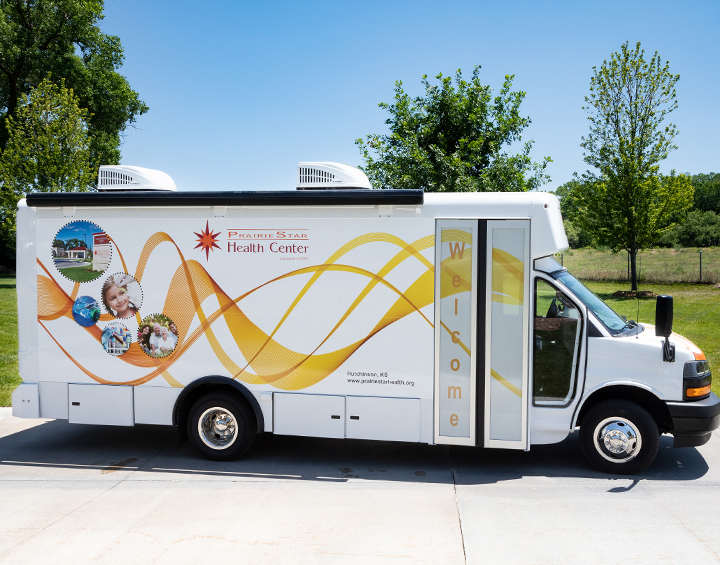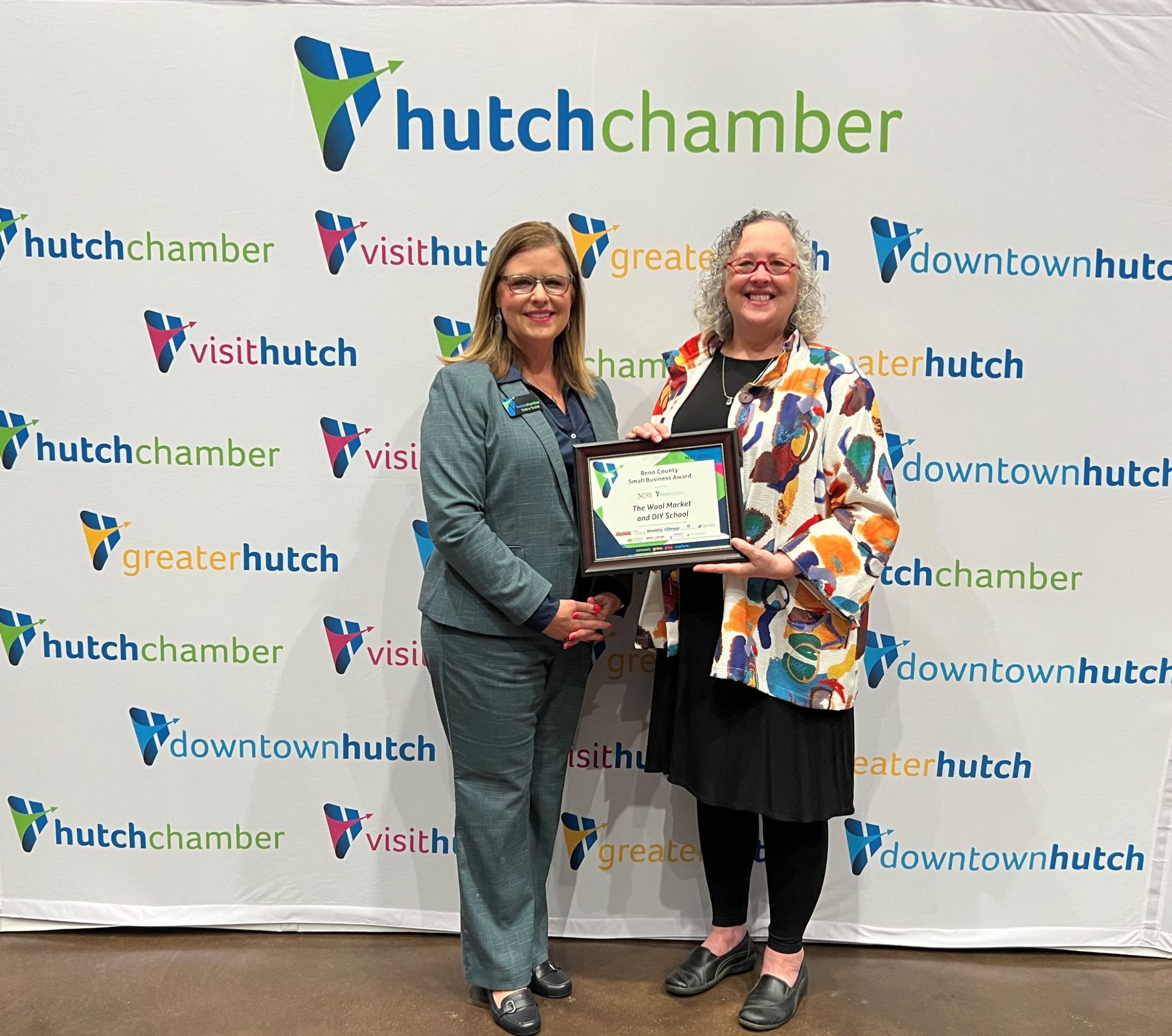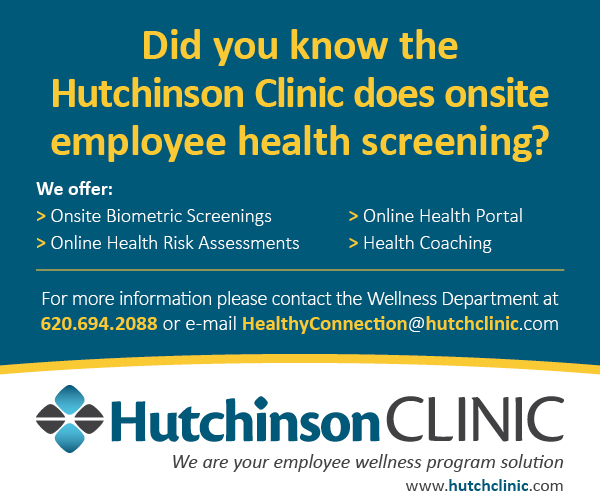Collins Bus and PrairieStar's new mobile medical clinic will help deliver care to rural communities
Friday, June 18, 2021

A new “mobile medical clinic,” parked Wednesday on the east side of the building, is something its developer, Collins Bus Corporation of South Hutchinson, anticipates becoming a new product line at the local manufacturing plant.
PrairieStar took delivery in April of the prototype the two businesses collaborated to create but sent it off for a custom-printed vehicle wrap before its unveiling, and it just returned.
The specially-equipped small RV was one of three the South Hutchinson-based small school bus maker now delivered to health care providers. The others went to the Johnson County Health Department and Guilford County, North Carolina.
With the need for COVID-19 testing and vaccine distribution, 'the timing was right'
The initiative began late last year, said PrairieStar CEO Bryant Anderson, when administrative staff at PrairieStar were brainstorming on the best way to use federal CARES Act dollars: distributed through the “Expanding Capacity for Coronavirus Testing” or ETC program.
He wanted it to be a wise use of money, Anderson said, that also could impact the larger community.
“We have to give the credit to Mona,” he said, referring to PrairieStar's Chief Quality Officer, Mona Broomfield, RN. “For several years, Mona has had a vision for a mobile clinic, but we just really hadn’t had the means to do it.”
Raised in Sylvia, Broomfield said, she knows how difficult it is for people in small towns to get to a doctor.
"Sylvia is 30 to 35 miles, but to people that live in some of those small communities, it might as well be 350 miles to get to medical care,” she said. “I’ve always had a vision to take medical care to Plevna, Sylvia, Turon, all those places. It’s not only about COVID and flu season and such, but all the other things that people have that it’s difficult to travel here for, chronic conditions.”
With a need for COVID-19 rapid testing, and in anticipation of vaccine distribution, “the timing was right,” Anderson said, to pursue it. “It just seemed to make sense and management locked onto it.”
When they approached officials at Collins Bus, the company had already been contemplating such a vehicle, said Chris Hiebert, vice president and general manager at Collins. The plant was searching for options to replace a line of commercial shuttles it sold to airports and hotels it will no longer make.
"That section of our business was divested out, and we were no longer in a position where we could build commercial products," he said. "So, we were looking for another product that would fill our seasonal ups and downs that come with our base business, which is building Type A school buses."
Engineers worked with PrairieStar medical staff to develop mobile clinic
Engineers at the plant drafted a proposed layout for the vehicle, which medical staff at PrairieStar then reviewed and suggested changes to.
“We walked through a regular exam room and our ED (emergency department) to see where things should go and what aspects work a lot together to create the right flow,” Broomfield said, and they made suggestions on how to move things around, including relocating the restroom and adding a place to store files.
The van is designed to be small enough to let clinic staff drive it without requiring a commercial driver’s license but large enough to accommodate a variety of standard clinic uses.
The vehicle's interior is divided in half.
In front is a chair with a seatbelt that a second staff person can ride in going to the clinic site but then used by patients when staff is drawing blood or administering vaccines.
The front half also has a medical-grade refrigerator, microwave, a work counter, and shelving.
The back half is a small exam room, including an examination table set up as a chair but that can fold down to fully recline. On its walls are also the typical exam room instruments. There is also a refrigerator in the back.
Beneath the vehicle is a bank of batteries that will enable the equipment to run up to five hours without running a generator or lacking electrical hookups. The batteries charge when the vehicle, which has a 6.0-liter engine on a 14,000-pound Chevy cutaway chassis, is running.
“Its use is not limited,” Broomfield said on the van. "Whatever we think of, we can do. Granted, we're not going to have extensive things like radiology, but the majority of chronic diseases can be cared for on our mobile unit. I could see potentially setting up at a school for enrollment for anybody that doesn't have their immunizations done."
They are also considering taking it to job sites where they have contracts to do medicals, fit tests, or drug tests.
The vehicle has internet connectivity. It’s not set up with telehealth specifically in mind, Anderson said, but, "if we go to a small community without a primary care provider and need to tap into a specialist somewhere, we’ll be able to do it."
Mobile clinic schedule, storage still need to be worked out
They haven’t developed a use schedule yet, but Anderson anticipates the vehicle, which “is ready to go,” could be on the road by the second week of July.
“We don’t know how heavily it will be used at this point, but I perceive it being used a lot,” Anderson said. “Seasonally, it may be several days a week.”
One thing still needing to be addressed is where to house the new vehicle because it doesn’t fit in the center’s existing garages.
“We’re building a garage for it,” Anderson said. “It should be done in the next eight or nine months.”
In the meantime, Radley Brooks, with PRMI on 30th Avenue, is allowing them to store it in one of his buildings.
Collins will outfit each van it builds with a standard set of equipment, including a pair of small refrigerators, but it will be up to each buyer what else to include in the unit. Options not on the PrairieStar vehicle include a handicap ramp or a wheelchair lift and window on the side of the van, said Cody Stefek, engineering manager at Collins. Not having the lift allows an extended countertop in the rear, he said.
Other features include a step for rear access that automatically extends when the door opens. Operators can override the controls to keep it out, but it will automatically retract if the vehicle starts.
The van also has a retractable awning on one side with sensors that will fold it up if wind speeds reach a certain level.
Two air conditioning/heating units with separate controls for each half of the van will also be standard, Stefek said.
PrairieStar has equipped its vehicle to do COVID-19 tests, flu and strep tests and other simple screenings, said Larry Burgey, Chief Operating Officer.
“There will be a full phlebotomy blood station in there,” he said. “They can draw blood in there, refrigerate it and bring it back into the clinic to run any lab that patient may need. We’ll have A1C instruments, blood glucose, coagulation analyzers.”
“I’m thrilled with it,” Broomfield said. “I hope to go on runs. I’m going to ask to go the first time it goes to Sylvia.”
Collins Bus plans for vehicle to become part of primary manufacturing line
The vehicle has not yet been introduced into the plant’s formal production line, pending approval from its parent company, REV Group, to move forward, Hiebert said.
But they do expect it to become part of the primary manufacturing line for the majority of the build, and then it will be pulled out on a side-line to finish.
The first one they started in November and completed on April 1. Once it’s a part of the manufacturing process, it will build much quicker.
Building the first one, they had to learn about a lot of different things they previously were not involved with, Stefek said, such as plumbing needs, freshwater and black-water tanks, and monitoring systems. They also were introduced to medical equipment requirements.
The vehicle is classified as an RV, rather than a bus, because of the plumbing. It will require an RV tag.
“We’re continuing to develop it,” Stefek said, “but we expect it to probably be about a three-week build time at a normal production rate.”
They are shooting to sell and build 20 to 25 units in 2022, Hiebert said.
“As a manufacturer, we want it to be cookie-cutter,” Hiebert said. “From that aspect, we want to make it appeal to the masses and keep customization low. However, we believe it can be done so that it’s not only used for medical but could be used for dental or optometry. There’s a lot of room to grow.”
The cost of the unit will range between $150,000 and $175,000, Hiebert said.
“This is day one kicking off our marketing with the announcement and unveiling the unit,” he said.
Anderson secured a “preferred vendor endorsement” for Collins Bus with the National Association of Community Health Centers, giving the manufacturer access to more than 14,000 health center sites in the U.S.
Production of mobile clinic vehicle can help preserve jobs in South Hutchinson
Hiebert doesn’t expect the product to create new jobs at the bus plant in South Hutchinson but to enable the company to retain staff otherwise lost with the shutdown of the shuttle bus product line.
Although they officially got out of the shuttle bus business in May 2020, Hiebert said, there are still some to build under a previous contract. The last of those, going to the Florida Department of Transportation, will be manufactured through the end of this year, he said. But they’ll start backfilling that department with new mobile clinic orders.
“This is really a big deal when you consider the thrashing the economy has taken over the last year and a half,” Anderson said. “We both care about this economy in Hutchinson and Reno County. When the two teams came together it was a golden opportunity to respond. It will help both of us. It will help PrairieStar provide access to patient care in rural communities and delivering industrial care, and it will help Collins fill another need, with a product line to diversify.”
Reno County Health Department officials also were working with Collins Bus on the development of the mobile clinic late last year, but the Reno County Commission, after the county manager mentioned it at a meeting as a potential use of CARES Act dollars, voiced opposition to it, ending the health department’s role.
Hiebert said he believed the commission “shot it down prematurely,” before staff or Collins could make a case for it. But Collins moved on.
Written by John Green with the Hutchinson News
Published on June 17, 2021
Category: (none)




.jpg)






.png)







.jpg)
.jpg)










.jpg)
.jpg)

%20(1).png)